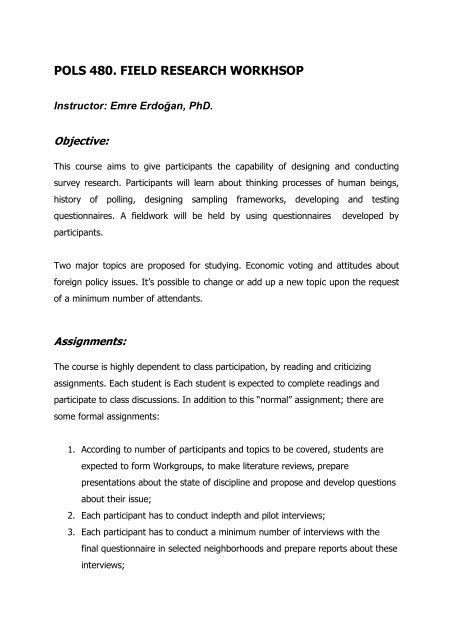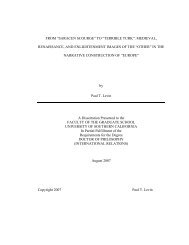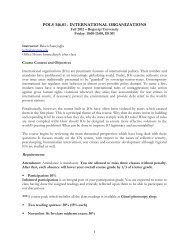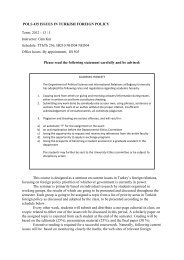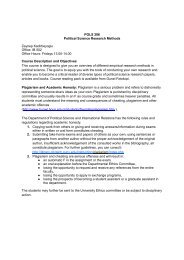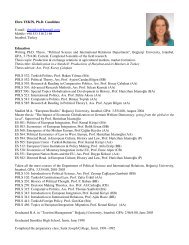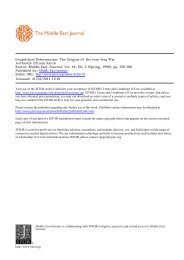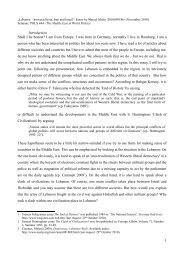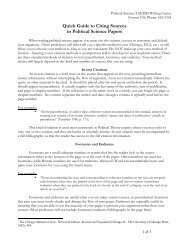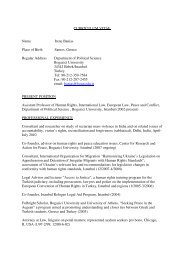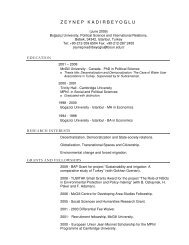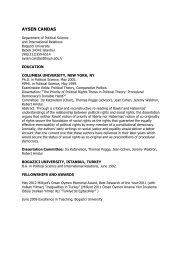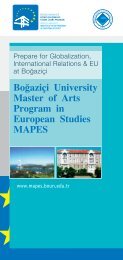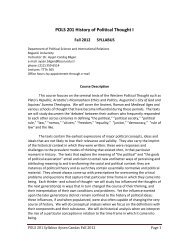Week 1 - Department of Political Science and International Relations
Week 1 - Department of Political Science and International Relations
Week 1 - Department of Political Science and International Relations
You also want an ePaper? Increase the reach of your titles
YUMPU automatically turns print PDFs into web optimized ePapers that Google loves.
POLS 480. FIELD RESEARCH WORKHSOP<br />
Instructor: Emre Erdoğan, PhD.<br />
Objective:<br />
This course aims to give participants the capability <strong>of</strong> designing <strong>and</strong> conducting<br />
survey research. Participants will learn about thinking processes <strong>of</strong> human beings,<br />
history <strong>of</strong> polling, designing sampling frameworks, developing <strong>and</strong> testing<br />
questionnaires. A fieldwork will be held by using questionnaires developed by<br />
participants.<br />
Two major topics are proposed for studying. Economic voting <strong>and</strong> attitudes about<br />
foreign policy issues. It’s possible to change or add up a new topic upon the request<br />
<strong>of</strong> a minimum number <strong>of</strong> attendants.<br />
Assignments:<br />
The course is highly dependent to class participation, by reading <strong>and</strong> criticizing<br />
assignments. Each student is Each student is expected to complete readings <strong>and</strong><br />
participate to class discussions. In addition to this “normal” assignment; there are<br />
some formal assignments:<br />
1. According to number <strong>of</strong> participants <strong>and</strong> topics to be covered, students are<br />
expected to form Workgroups, to make literature reviews, prepare<br />
presentations about the state <strong>of</strong> discipline <strong>and</strong> propose <strong>and</strong> develop questions<br />
about their issue;<br />
2. Each participant has to conduct indepth <strong>and</strong> pilot interviews;<br />
3. Each participant has to conduct a minimum number <strong>of</strong> interviews with the<br />
final questionnaire in selected neighborhoods <strong>and</strong> prepare reports about these<br />
interviews;
4. At the end <strong>of</strong> term, a take home exam will be given;<br />
Grading:<br />
1. Class Participation:10 Percent<br />
2. Presentations: 10 Percent<br />
3. Cognitive testing reports: 15<br />
4. Interviews. 15 Percent<br />
5. Take Home Exam: 50 Percent<br />
<strong>Week</strong> 1-February<br />
24th,<br />
<strong>Week</strong> 2- March 2nd;<br />
<strong>Week</strong> 3,<br />
March 9th;<br />
<strong>Week</strong> 4,<br />
March 16th,<br />
<strong>Week</strong> 5,<br />
March 23th,<br />
No Class,<br />
No Class<br />
Introduction<br />
What’s Public Opinion<br />
Thinking About Thinking<br />
Sampling<br />
H. <strong>of</strong> POR, pp.11-24; pp.83-93;<br />
pp.104-112<br />
H. <strong>of</strong> PM, pp.217-270; Elster, pp.7-<br />
52; Tversky <strong>and</strong> Kahnemann; H. <strong>of</strong><br />
POR, pp.127-140; pp.164-172;<br />
pp.175-183; pp.205-217<br />
H. <strong>of</strong> POR, pp.294-308; Kalton;<br />
<strong>Week</strong> 6, March 30th; Psychology <strong>of</strong> Survey Response; Tourengau et. al, pp.1-61; Alvarez<br />
<strong>and</strong> Brehm, pp. 15-51; H. <strong>of</strong> POR,<br />
361-373; pp374-388<br />
<strong>Week</strong> 6;<br />
April 6th;<br />
Questionnaire Design <strong>and</strong><br />
Interviewing<br />
Fowler, pp.1-104<br />
<strong>Week</strong> 7;<br />
April 13th;<br />
<strong>Week</strong> 8;<br />
April 20th;<br />
<strong>Week</strong> 9;<br />
April 27th;<br />
<strong>Week</strong> 10;<br />
May 4th;<br />
<strong>Week</strong> 11;<br />
May 11th;<br />
<strong>Week</strong> 12; May 18th;<br />
Improving Questions<br />
Spring Break<br />
Cognitive Interviewing<br />
Data Entry<br />
Basic Data Analysis<br />
Presentations<br />
Fowler, pp.105-179 <strong>and</strong><br />
Presentations<br />
Willis
Basic Readings about Polling<br />
Alvarez, R. M. <strong>and</strong> Brehm J.; 2002; Hard Choices <strong>and</strong> Easy Answers; Princeton<br />
University Press;<br />
Elster, J. 2007, Explaining Social Behavior: More Nuts <strong>and</strong> Bolts for the Social<br />
<strong>Science</strong>s, Cambridge University Press.<br />
Fowler, F. J., 1995; Improving Survey Questions; Sage;<br />
Kalton, G., 1983; Introduction to Survey Sampling; Sage University Press;<br />
Oxford H<strong>and</strong>book <strong>of</strong> <strong>Political</strong> Methodology (H<strong>of</strong>PM)<br />
The Sage H<strong>and</strong>book <strong>of</strong> Public Opinion Research (H<strong>of</strong>POR)<br />
Tourengeau R.; Rips, L. J. Rips, K. Rasinski; 2000; The Psychology <strong>of</strong> Survey<br />
Response; Cambridge University Press;<br />
Tversky A. <strong>and</strong> Kahnemann D.; Judgment under Uncertainty: Heuristics <strong>and</strong> Biases; <strong>Science</strong>,<br />
New Series, Vol. 185, No. 4157 (Sep. 27, 1974), pp. 1124-1131;<br />
Basic Readings about Topics:<br />
Economic Voting:<br />
Anderson, C. J. (2007), "The End <strong>of</strong> Economic Voting? Contingency Dilemmas <strong>and</strong><br />
the Limits <strong>of</strong> Democratic Accountability," Annual Review <strong>of</strong> <strong>Political</strong> <strong>Science</strong><br />
(10:1), pp. 271-296.<br />
Başlevent, C., Kirmanoğlu, H. <strong>and</strong> Şenatalar, B. (2005), “Empirical Investigation <strong>of</strong><br />
Party Preferences <strong>and</strong> Economic Voting in Turkey”, European Journal <strong>of</strong><br />
<strong>Political</strong> Research, V:44, pp. 547–562
Çarkoğlu, A. (2008), “Ideology or Economic Pragmatism?: Pr<strong>of</strong>iling Turkish Voters in<br />
2007”, Turkish Studies, Vol.9, No. 2, pp.317–344<br />
Çarkoğlu, A. <strong>and</strong> Kalaycıoğlu, E. (2007), Turkish Democracy Today: Elections, Protest<br />
<strong>and</strong> Stability in an Islamic Society, London : I. B. Tauris,<br />
Esmer, Y. <strong>and</strong> Pettersson T. (2007) 'The effects <strong>of</strong> religion <strong>and</strong> religiosity on voting<br />
behavior.' in Klingeman, H. <strong>and</strong> Dalton,R.(Eds), The Oxford H<strong>and</strong>book <strong>of</strong><br />
<strong>Political</strong> Behavior, Oxford: Oxford University Press.<br />
Esmer, Y., “At the ballot box: Determinants <strong>of</strong> voting behavior in Turkey” In Politics,<br />
Parties <strong>and</strong> Elections in Turkey, Y. Esmer <strong>and</strong> S. Sayarı (eds.), Boulder:<br />
Lynn Rienner, 2002.<br />
Hazama, Y., (2006),” Retrospective Voting in Turkey: Macro <strong>and</strong> Micro Perspectives”,<br />
Institute <strong>of</strong> Developing Economies, JETRO,<br />
Lewis-Beck, M. S., Nadeau, R. <strong>and</strong> Elias, A. (2008), "Economics, Party, <strong>and</strong> the Vote:<br />
Causality Issues <strong>and</strong> Panel Data," American Journal <strong>of</strong> <strong>Political</strong> <strong>Science</strong><br />
(52:1), pp. 84--95.<br />
S<strong>and</strong>ers, D. <strong>and</strong> Gavin, N. (2004), "Television News, Economic Perceptions <strong>and</strong><br />
<strong>Political</strong> Preferences in Britain, 1997-2001," The Journal <strong>of</strong> Politics (66:4),<br />
pp. 1245-1266.<br />
Tilley, J. <strong>and</strong> Hobolt, S. B. (2011), "Is the Government to Blame? An Experimental<br />
Test <strong>of</strong> How Partisanship Shapes Perceptions <strong>of</strong> Performance <strong>and</strong><br />
Responsibility," The Journal <strong>of</strong> Politics (73:02), pp. 316--330.
Public Opinion <strong>and</strong> Foreign Policy Issues<br />
Caspary, W., 1970, “The ‘Mood Theory’: A Study <strong>of</strong> Public Opinion <strong>and</strong> Foreign<br />
Policy,” The American <strong>Political</strong> <strong>Science</strong> Review, Vol. 64, No. 2, s. 536-547.<br />
Çarkoğlu, A. 2003, “Who Wants Full Membership? Characteristics <strong>of</strong> Turkish Public<br />
Support for EU Membership,” Turkish Studies, Vol. 4, No 1.<br />
Gönlübol, M. 1968, "Kamuoyu ve Dış Politika," Ankara Üniversitesi Siyasal Bilgiler<br />
Fakültesi Dergisi, C. 23, No. 4, s. 87-110.<br />
Holsti O., 1992, Public Opinion <strong>and</strong> Foreign Policy Challenges to the Almond-<br />
Lippman Consensus,” <strong>International</strong> Studies Quarterly, 1992, 36, s. 440.<br />
Kalaycıoğlu, E., 2009, “Public Choice <strong>and</strong> Foreign Affairs: Democracy <strong>and</strong><br />
<strong>International</strong> <strong>Relations</strong> in Turkey,” New Perspectives on Turkey, No. 4,<br />
Bahar 2009.<br />
Peffley <strong>and</strong> Hurwitz, 1987 "How Are Foreign Policy Attitudes Structured? A<br />
Hierarchical Model," (Jon Hurwitz ile birlikte), American <strong>Political</strong> <strong>Science</strong><br />
Review, 81(4): s. 1099-1120.<br />
Şenyuva Ö. 2006, “Turkish Public Opinion <strong>and</strong> European Union: The State <strong>of</strong> the Art<br />
in Public Opinion Studies in Turkey,” Perceptions, Bahar 2006.<br />
Yılmaz, H. 2004,, “Turkey, within or outside Europe? A Historical Perspective,”<br />
Proceedings <strong>of</strong> IMEIS ve Collingwood College Seminar, University <strong>of</strong><br />
Durham, 2004.


